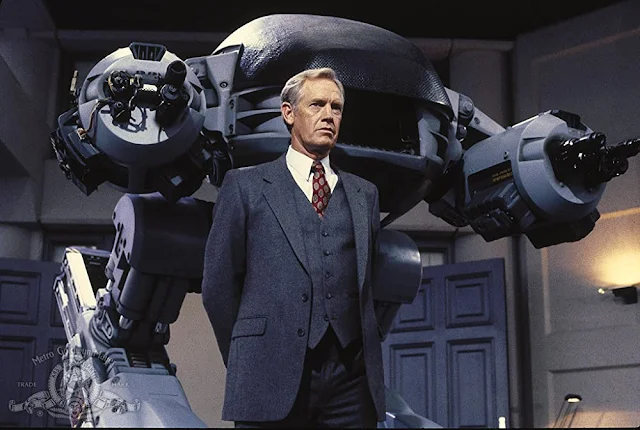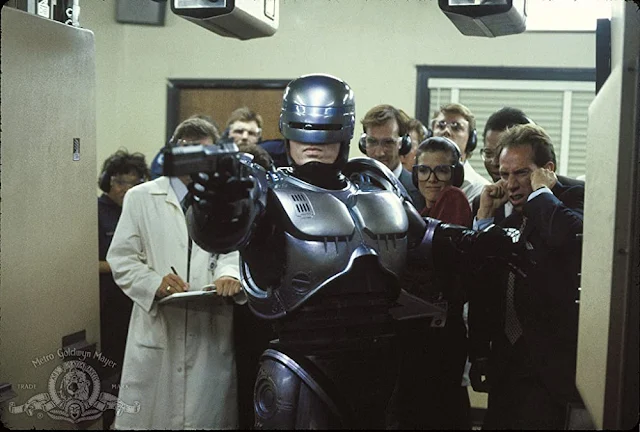Verhoeven's unique style often incorporates social commentary and explores themes of violence, corruption, and the dark side of humanity.
Set in a dystopian future in crime-ridden Detroit, the plot of "RoboCop" revolves around a dedicated police officer named Alex Murphy, who is brutally murdered by a gang of criminals. His remains are used by Omni Consumer Products (OCP), a powerful corporation, to create a cyborg law enforcement officer known as RoboCop. As RoboCop, Murphy fights crime and seeks to bring justice to the city while uncovering a web of corruption and conspiracies within the police force and OCP.
 |
| Your move, creep! |
"RoboCop" explores the main themes of corruption and corporate control, shedding light on the influence of corrupt corporations, particularly OCP, and their pursuit of profit at the expense of ethics (what a classic tale!). The film also comments on the complex relationship between big business and government, highlighting the dangers of their collusion.
Corruption and Corporate Control
"RoboCop" portrays corrupt corporations as significant players in the film's dystopian society. OCP is depicted as a powerful entity that not only controls law enforcement but also influences political decisions. The film reveals how OCP manipulates the system to further its own interests, disregarding the well-being of society.
The depiction of OCP in "RoboCop" showcases the corporation's relentless pursuit of profit at the expense of ethics and human lives. OCP's executives are shown to be morally bankrupt, prioritizing financial gain over the welfare of the city's residents. They view Detroit as a test market for their new technologies and disregard the human cost of their actions.
The film raises questions about the relationship between big business and government, highlighting the dangers of their collusion. "RoboCop" presents a scenario where OCP essentially controls law enforcement, using it as a tool to maintain their dominance and suppress dissent. This portrayal reflects a critique of the close ties between corporations and government, where corporate interests often influence decision-making processes.
The film suggests that when corporate power goes unchecked, corruption flourishes, leading to a disregard for human life and the erosion of societal values. The dystopian world of "RoboCop" serves as a cautionary tale, emphasizing the need for transparency, accountability, and ethical considerations in the face of corporate control.
Identity and Humanity
In "RoboCop," the transformation of Alex Murphy into RoboCop raises profound questions about identity. Alex Murphy starts as a human police officer, but after being brutally murdered and resurrected as a cyborg, his identity undergoes a significant shift. The physical transformation into RoboCop alters his appearance and capabilities, blurring the line between man and machine. This transformation poses a fundamental question:What does it mean to be human?
The film delves into themes of humanity and morality as Murphy grapples with his dual nature. As RoboCop, he is programmed to uphold the law and eliminate criminals, but he also retains memories and flashes of his past life as a human. Murphy struggles to reconcile his human past with his robotic present, often experiencing conflicting emotions and memories. This internal struggle reflects the tension between his programmed directives and his human consciousness, highlighting the complex interplay between technology and human morality.
"RoboCop" explores the role of emotions and memories in defining one's humanity. Despite being a highly advanced machine, Murphy retains fragments of his human memories and emotions. These glimpses of his past serve as reminders of his human identity and shape his understanding of right and wrong. The film suggests that emotions and memories play a crucial role in shaping one's moral compass and maintaining a connection to one's humanity.
Furthermore, the portrayal of other characters in the film also contributes to the exploration of identity and humanity. For instance, Officer Lewis, Murphy's former partner, provides a contrast to RoboCop's cold and calculated demeanor. Lewis embodies empathy, compassion, and a sense of humanity, highlighting the importance of these qualities in defining one's identity.
Through the examination of identity and humanity, "RoboCop" prompts viewers to reflect on the essence of being human. It questions the boundaries between man and machine, morality and programming, and the significance of emotions and memories in shaping our understanding of ourselves. The film challenges us to consider the ethical implications of technological advancements and the potential consequences of losing touch with our shared humanity.
Violence and Satire
"RoboCop" employs excessive violence as a means of satirical commentary. The film's use of graphic and over-the-top violence serves as a critique of the desensitization and glorification of violence in popular culture. By exaggerating the brutality of the action sequences, the film aims to provoke a reaction from the audience, challenging their acceptance and normalization of violence in entertainment.
"RoboCop" satirizes various aspects of American culture, consumerism, and media violence. The film presents a dystopian version of society where corporations, such as OCP, dominate every aspect of life, including law enforcement. This satirical depiction criticizes the influence of corporate power on society and portrays a world where profit-driven entities dictate the rules.
Furthermore, the film takes aim at the pervasive consumer culture by featuring satirical advertisements and TV shows that emphasize mindless consumption and the dehumanization of individuals (. It mocks the obsession with material possessions and highlights the shallow values that underpin consumerist societies.
Moreover, "RoboCop" satirizes media violence by depicting a future where sensationalistic and violent programming, such as "I'd Buy That for a Dollar" and the news broadcasts, dominate the airwaves. This satire serves as a commentary on the role of media in shaping public opinion and the desensitization of audiences to violence through constant exposure.
The film's blend of excessive violence and satire contributes to its overall message and audience reception. The graphic violence serves as a deliberate shock tactic, forcing viewers to confront the consequences and moral implications of unchecked violence. It challenges the audience's complacency towards violence in entertainment and encourages critical reflection.
The satire in "RoboCop" adds an additional layer of critique, exposing the darker elements of American culture, consumerism, and media influence. Through satire, the film prompts viewers to question the societal norms and values depicted, inviting a reevaluation of their own perspectives.
The impact of the film's violence and satire on audience reception varies. Some viewers may appreciate the film's satirical commentary and its unapologetic approach to violence as a means of social critique. They may recognize the film's intention to provoke thought and engage in discussions about the themes it explores.
However, others may find the violence excessive or misinterpret the satire, perceiving it merely as gratuitous violence without recognizing its satirical intent. The film's polarizing nature and the discomfort it may evoke are deliberate choices that aim to challenge conventional storytelling and provoke a reaction from its audience.
 |
| Peter Weller as Robocop |
Dystopia and Social Critique
"RoboCop" presents a dystopian vision of Detroit, highlighting the decay and despair of the city. The film portrays a future where crime and corruption run rampant, and the urban landscape is characterized by dilapidated buildings, poverty-stricken neighborhoods, and a general sense of decay. This dystopian setting serves as a backdrop to explore deeper social issues and critique the flaws of society.
The film embeds a powerful social critique, addressing themes such as urban decay, income inequality, and the dehumanizing effects of technology. The depiction of the crumbling infrastructure and poverty-stricken areas in Detroit reflects the consequences of neglect and social inequality. "RoboCop" highlights the stark contrast between the affluent corporate elite, represented by OCP, and the impoverished majority, emphasizing the glaring income disparity and the exploitation of the underprivileged.
Additionally, the film critiques the dehumanizing effects of technology and the erosion of human connection. Through the transformation of Alex Murphy into RoboCop, the film explores the dangers of reducing individuals to mere machines and the loss of empathy and compassion in a hyper-technological society. It questions the ethical implications of relying solely on technology to solve complex social problems.
"RoboCop" serves as a cautionary tale, warning against the potential consequences of unchecked power and societal apathy. The film portrays a world where corporations like OCP wield immense influence over government and law enforcement, resulting in rampant corruption and a disregard for human life. This narrative serves as a stark reminder of the dangers of allowing unchecked corporate control and the erosion of democratic values.
Furthermore, the film critiques societal apathy by showcasing characters who are indifferent to the suffering around them. From the callous executives at OCP to the indifferent citizens who are desensitized to violence, "RoboCop" highlights the consequences of societal indifference and the need for individuals to stand up against injustice and corruption.
Conclusion of Robocop's themes
Throughout this essay, we have explored several prominent themes present in the 1987 film "RoboCop." These themes include corruption and corporate control, identity and humanity, violence and satire, and dystopia and social critique. The film skillfully examines these themes, providing a thought-provoking commentary on the societal issues it addresses.
"RoboCop" continues to hold enduring relevance and has had a significant impact on popular culture. The film's exploration of corruption, corporate influence, and the dehumanizing effects of technology remains pertinent in today's world. Its satirical portrayal of American culture, consumerism, and media violence has influenced subsequent works and serves as a critical touchstone in discussions surrounding these topics.
In conclusion, "RoboCop" stands as a cinematic achievement that intertwines social commentary with gripping action. Its exploration of themes such as corruption, identity, violence, and dystopia invites viewers to reflect on the consequences of unchecked power, the importance of preserving our humanity, and the potential pitfalls of a society driven by profit and apathy. The film's lasting significance lies in its ability to engage and challenge audiences, urging them to consider the implications of the issues it confronts. As the years pass, "RoboCop" continues to be a cultural touchstone, reminding us of the importance of vigilance, ethical considerations, and the responsibility to shape a just and compassionate society.
Check out Robocop trivia.

















